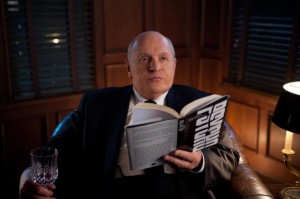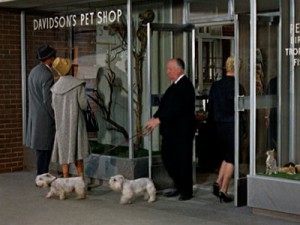HITCHCOCK: 4 STARS
 At one point in “Hitchcock,” the master of suspense (played by Anthony Hopkins), says, “Audiences want to be shocked—they want something different.” He’s referring to the content of “Psycho,” his ground breaking 1960 horror film, but while 2012 audiences may not be shocked by the content of this new biopic, they will get something different. At least if they are expecting a blow-by-blow of the shooting of the story of Norman Bates and the infamous shower scene. It’s not a retelling of the making of a movie it’s the story of the most important relationship in Hitch’s life.
At one point in “Hitchcock,” the master of suspense (played by Anthony Hopkins), says, “Audiences want to be shocked—they want something different.” He’s referring to the content of “Psycho,” his ground breaking 1960 horror film, but while 2012 audiences may not be shocked by the content of this new biopic, they will get something different. At least if they are expecting a blow-by-blow of the shooting of the story of Norman Bates and the infamous shower scene. It’s not a retelling of the making of a movie it’s the story of the most important relationship in Hitch’s life.
Following the release of “North by Northwest” Alfred Hitchcock was struggling to make a change from the big budget, elegant thrillers he was known for to something shocking. Trouble is, nothing grabbed his attention. Novels sent over for his approval are dismissed as “sleeping pills with dust jackets,” until he picks up a down-and-dirty book by Robert Bloch called “Psycho.” It’s “low budget, horror claptrap,” says his wife Alma (Helen Mirren), but he’s determined to make it, even if he has to pay for it himself.
That’s the Hollywood portion of the movie, the part Hitchcock would have called “MacGuffin,” the story element that gets the rest of the plot in gear, but isn’t terribly important to the overall story. The main thrust of the movie is Hitchcock’s quest to be relevant, to take risks, to be free—like he was before the fame—and the effect this has on his relationship with Alma.
Based on Stephen Robello’s book “Alfred Hitchcock and the Making of Psycho,” “Hitchcock” is a fast-paced and surprisingly touching marital drama peppered with lots of insider Hollywood legend.
We learn about Hitch’s troubled relationship with Vera Miles (Jessica Biel) who chose motherhood over the director’s offer to make her a star. We see his cordial relationship with Janet Leigh (Scarlett Johansson), who says, “Compared to Orson Welles, he’s a sweetheart,” and get an up-close look at familiar Hitchcock themes of voyeurism, sexual repression, betrayal, obsession and identity.
What is unexpected is the depth of the relationship between Hitch and Alma. She is seen her in a professional capacity as an assistant director, screenwriter and editor, but it is as muse, lifeblood and lone redhead in the sea of blondes that so bewitched Hitch, which is the most important part of the story.
The role of Alma is underwritten, but Mirren brings it to vibrant life, creating a character that is not supplemental to Hitchcock’s success, but the very reason for it.
It is Hopkins, however, who has the most fun here. There’s a playfulness in the performance from the fourth wall breaking narration that opens and closes to the movie to the little ballet he does as he listens to the opening night audience shriek and scream to the infamous shower scene.
Hopkins doesn’t exactly look like Hitchcock but gets the essence in a buoyant performance that betrays the fun the actor must have had creating it. He has the movie’s best lines—“I only wish (“Psycho” inspiration) Ed Gein looked more like William Holden and less like Elmer Fudd,” he says to reporters.”—but also provides many subtle shadings of the sadness Hitchcock carried with him. It is a performance that ironically could earn the Oscar that was denied to the director during his lifetime.
“Hitchcock” is a stylish film that pays homage to not only “Psycho,” but to Hitchcock’s other films, most notably the umbrella scene in Foreign Correspondent, but is also a tribute to one of the great film partnerships in Hollywood history.

